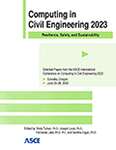Residential Wildfire Structural Damage Detection Using Deep Learning to Analyze Uncrewed Aerial System (UAS) Imagery
Publication: Computing in Civil Engineering 2023
ABSTRACT
Wildfire damage related to residential areas causes enormous economic and social losses. Therefore, appropriate measures must be taken at the appropriate time to reduce the damage to residential infrastructure caused by the disaster. Post-wildfire assessment of a home can play an important role in understanding the overall extent of damage and developing a disaster mitigation plan for the future. Unfortunately, these assessments require extensive on-site investigation, which takes a lot of human resources and time. As a way to compensate for this, this study provides an efficient and effective methodology to perform damage assessments of housing after a wildfire using deep learning techniques to efficiently analyze unmanned aircraft systems’ (UAS) imagery of residential areas. Application of this efficient methodology reduces the need for on-site investigation and associated safety risks as well as enables decision-makers to rapidly assess a large area to determine the relative degree of damage to structures and develop cost estimates for a community for damages after a wildfire.
Get full access to this article
View all available purchase options and get full access to this chapter.
REFERENCES
Abatzoglou, J. T., and Williams, A. P. (2016). Impact of anthropogenic climate change on wildfire across western US forests. Proceedings of the National Academy of Sciences, 113(42), 11770–11775.
FEMA. (2021). 2021 Preliminary Damage Assessment Guide. <https://www.fema.gov/disaster/how-declared/preliminary-damage-assessments/guide/>(Sep. 4, 2021).
Fischer, E., et al. (2022). The 2021 Marshall fire, Boulder County, Colorado.
Gabbert, B. (2022). Marshall Fire Archives. <https://wildfiretoday.com/tag/marshall-fire/>(Oct. 29, 2022).
Kramer, H. A., Butsic, V., Mockrin, M. H., Ramirez-Reyes, C., Alexandre, P. M., and Radeloff, V. C. (2021). Post-wildfire rebuilding and new development in California indicates minimal adaptation to fire risk. Land Use Policy, 107, 105502.
Stehman, S. V. (1997). Selecting and interpreting measures of thematic classification accuracy. Remote sensing of Environment, 62(1), 77–89.
Syphard, A. D., Rustigian-Romsos, H., Mann, M., Conlisk, E., Moritz, M. A., and Ackerly, D. (2019). The relative influence of climate and housing development on current and projected future fire patterns and structure loss across three California landscapes. Global Environmental Change, 56, 41–55.
Szegedy, C., Vanhoucke, V., Ioffe, S., Shlens, J., and Wojna, Z. (2016). Rethinking the inception architecture for computer vision. In Proceedings of the IEEE conference on computer vision and pattern recognition (pp. 2818–2826).
Information & Authors
Information
Published In
History
Published online: Jan 25, 2024
ASCE Technical Topics:
- Artificial intelligence and machine learning
- Buildings
- Business management
- Computer programming
- Computing in civil engineering
- Design (by type)
- Disaster risk management
- Disasters and hazards
- Engineering fundamentals
- Infrastructure
- Natural disasters
- Neural networks
- Personnel management
- Practice and Profession
- Residential buildings
- Residential location
- Structural design
- Structural engineering
- Structural safety
- Structures (by type)
- Urban and regional development
- Urban areas
- Wild fires
Authors
Metrics & Citations
Metrics
Citations
Download citation
If you have the appropriate software installed, you can download article citation data to the citation manager of your choice. Simply select your manager software from the list below and click Download.
